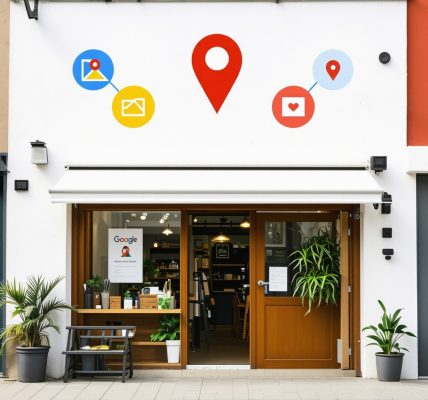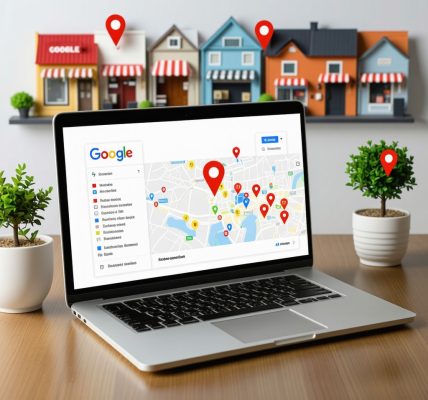Unlocking the Power of Local SEO: Why Tools Matter More Than Ever
In the fiercely competitive realm of local search, mastering your Google My Business (GMB) ranking isn’t just an advantage—it’s essential for survival. Leveraging the right tools can transform your local SEO strategy from guesswork into a precise, data-driven process. These tools empower businesses to optimize listings, track performance, and outpace competitors in local search results. But which tools truly dominate the landscape for boosting GMB rankings in 2025?
Precision Analytics: Harnessing Data to Elevate Your Local Presence
At the core of effective local SEO is a deep understanding of your audience and competitive environment. Tools like BrightLocal and SEMrush’s Local SEO Toolkit provide granular insights into keyword rankings, citation consistency, and competitor analysis. For example, BrightLocal’s citation tracking helps identify missing or inconsistent business details across directories, a critical factor Google uses to assess trustworthiness. Such tools enable businesses to refine their local signals meticulously, ensuring that every listing detail contributes to higher GMB visibility.
Automation Meets Authenticity: Streamlining Review Generation and Management
Positive reviews are a cornerstone of GMB ranking factors. Platforms like Grade.us and Podium automate review solicitation while maintaining a personalized touch, encouraging genuine customer feedback. This dual benefit not only amplifies your local reputation but also signals to Google that your business is active and trusted by its community. Integrating these tools into your workflow can systematically boost your review volume and quality, a proven strategy highlighted in expert GMB review generation guides.
Optimizing Visual Appeal: The Role of Photo and Content Management Tools
Engaging visuals and regularly updated content can significantly affect local engagement metrics. Tools like Canva for image creation and Google Posts scheduling platforms help businesses maintain vibrant and current GMB profiles. Consistently refreshed content and high-quality photos increase user interaction and dwell time, factors that Google interprets as signals of relevance and activity.
How Do These Tools Integrate to Create a Cohesive Local SEO Strategy?
The real magic happens when these tools are used in concert. For instance, combining citation management tools with review automation and content scheduling creates a comprehensive approach that covers all critical ranking factors: accuracy, reputation, and engagement. This synergy not only boosts your GMB rankings faster but also sustains long-term local visibility, driving consistent traffic and leads.
If you’re interested in diving deeper into actionable tactics, explore our detailed insights on fastest ways to rank your Google Business Profile and comprehensive GMB SEO audits to identify unique growth opportunities.
Ready to transform your local SEO game? Share your experiences or questions below to join our community of local SEO experts driving real results.
For authoritative guidance on the critical role of local citations in Google’s algorithm, the Moz Local Learning Center offers in-depth research and best practices worth exploring.
Synergizing Citation Management and Review Automation for Maximum Impact
While individual tools excel in their specific functions, the cutting-edge advantage emerges when businesses integrate citation management systems with automated review generation platforms. Ensuring citation consistency across all directories not only enhances Google’s trust in your business but also primes your listing for higher rankings. Coupling this with an automated, yet personalized, review solicitation process amplifies your local reputation dynamically. This dual-pronged approach creates a reinforcing loop: accurate citations improve visibility that attracts more customers, who then provide reviews, further boosting your profile’s authority.
For businesses seeking to master this integration, exploring expert resources such as our guide on managing GMB citations for local ranking gains can provide actionable frameworks and tools recommendations.
Leveraging User-Generated Content and Google Posts to Enhance Engagement Signals
Beyond reviews, encouraging user-generated content (UGC) like photos, Q&A interactions, and posts can significantly influence engagement metrics on your Google Business Profile. Platforms that facilitate easy collection and scheduling of fresh content ensure your GMB listing remains vibrant and relevant. Google interprets consistent updates and authentic community interactions as strong signals of an active and trustworthy business, positively impacting your local search rankings.
Moreover, scheduling Google Posts through specialized content management tools allows businesses to promote offers, events, and news seamlessly, enhancing click-through rates and customer interaction. Implementing these strategies requires a strategic content calendar aligned with your local SEO objectives.
What Are the Emerging Challenges in Integrating Multiple Local SEO Tools Without Compromising Data Accuracy?
While integrating various local SEO tools offers powerful advantages, it also introduces complexities around data synchronization and accuracy. Discrepancies in business information across platforms can confuse search engines, diluting ranking signals. Experts must navigate challenges such as duplicate listings, inconsistent NAP (Name, Address, Phone) data, and varying update cycles between tools.
To mitigate these risks, employing centralized dashboards or platforms that consolidate data management becomes essential. Regular audits and validation processes ensure that all integrated systems reflect uniform and up-to-date information. Monitoring tools that alert to inconsistencies can prevent potential ranking penalties and maintain the integrity of your local SEO strategy.
For a comprehensive approach to these challenges, Moz Local Learning Center provides authoritative research and best practices on citation accuracy and management, a critical aspect of successful local SEO.
Engage with us: Have you faced challenges integrating multiple local SEO tools? Share your experiences or ask questions in the comments to help refine strategies within our expert community.
Mastering the Art of Local SEO Tool Ecosystems: Balancing Integration and Data Integrity
As businesses scale their local SEO efforts, the complexity of managing multiple platforms and tools increases exponentially. Integrating citation management, review automation, and content scheduling tools into a seamless ecosystem requires not just technical know-how but strategic foresight. The challenge lies in harmonizing disparate data sources to maintain accuracy while extracting actionable insights that fuel iterative optimization.
One advanced approach involves leveraging Application Programming Interfaces (APIs) to enable real-time synchronization among tools. This dynamic data exchange mitigates latency issues and reduces the risk of outdated or conflicting information propagating across listings. However, API integration demands a rigorous validation framework to ensure data fidelity, particularly in fields like NAP (Name, Address, Phone) where even minor inconsistencies can adversely impact Google My Business rankings.
How Can Businesses Ensure Consistent NAP Data Across Diverse Local SEO Platforms?
Ensuring consistent NAP data across multiple platforms requires an orchestrated strategy combining automation, manual verification, and monitoring. First, deploying centralized data repositories or master data management (MDM) systems acts as a single source of truth, reducing fragmentation. Tools like Yext or BrightLocal’s citation management feature facilitate bulk updates and synchronization, but human oversight remains critical to catch nuanced discrepancies.
Additionally, scheduling periodic audits using automated crawlers can identify duplicate listings, outdated addresses, or mismatches in contact information. Integrating alert systems to notify stakeholders of anomalies enables rapid remediation, preserving the trust signals Google relies on. Embracing a hybrid model of technology augmented by expert review is the hallmark of sophisticated local SEO operations.
Harnessing Machine Learning and AI for Predictive Local SEO Insights
The next frontier in local SEO tool utilization is the incorporation of machine learning (ML) and artificial intelligence (AI) to predict trends and recommend proactive actions. Modern tools are evolving beyond descriptive analytics to prescriptive intelligence, analyzing historical performance, competitor movements, and consumer behavior patterns to forecast ranking fluctuations and opportunity windows.
For instance, advanced platforms can detect emerging keyword patterns or shifts in local search intent, enabling businesses to tailor content and engagement strategies preemptively. Moreover, AI-driven sentiment analysis of reviews can prioritize response efforts based on the potential impact on reputation metrics. These capabilities transform local SEO from a reactive discipline into a strategic growth engine.
Industry research from Search Engine Land highlights how early adopters of AI-powered local SEO tools experience measurable gains in ranking stability and customer engagement, underscoring the value of embracing these innovations.
Advanced Attribution Models: Measuring the True Impact of Local SEO Efforts
One often overlooked aspect of local SEO tool integration is the ability to implement sophisticated attribution models that accurately assign value to various touchpoints in the customer journey. Traditional last-click models fail to capture the multifaceted interactions users have with local listings, reviews, posts, and citations.
Integrating tools that unify data across Google Analytics, call tracking, and GMB insights enables businesses to deploy multi-touch attribution frameworks. These models illuminate which elements of the local SEO strategy contribute most effectively to conversions, allowing for budget optimization and targeted enhancements. Leveraging such analytics demands technical expertise in data science but yields unparalleled clarity on ROI.
Ready to elevate your local SEO strategy with cutting-edge tool integration and data precision? Join our expert forum to exchange insights and discover bespoke solutions that drive tangible growth.
Bridging Data Integrity with AI-Driven Predictive Analytics in Local SEO
As local SEO landscapes become increasingly intricate, the fusion of rigorous data governance with artificial intelligence (AI) is redefining optimization strategies. Beyond mere automation, AI-powered tools now enable hyper-precise monitoring of citation consistency, user reviews, and engagement metrics, while simultaneously anticipating shifts in search patterns and consumer intent. This convergence empowers experts to preemptively refine Google My Business profiles, ensuring sustained prominence in competitive local markets.
Elaborating on API-Driven Ecosystems: Synchronizing Local SEO Efforts Seamlessly
API integration remains pivotal for businesses aiming to maintain real-time coherence across multiple platforms. By establishing robust API connections between citation management systems, review automation platforms, and content schedulers, organizations mitigate latency and data discrepancies that can impair ranking signals. However, the implementation of APIs requires meticulous validation frameworks and error-handling protocols to uphold data fidelity—a requisite for preserving the trustworthiness that Google prioritizes.
What Are the Best Practices for Implementing AI and API Integrations Without Sacrificing Data Accuracy in Local SEO?
Expert consensus suggests a multi-tiered approach: first, centralize NAP data within a master database to act as the definitive source. Next, deploy AI algorithms to continuously audit listing data, flagging anomalies and predicting potential ranking impacts. Concurrently, API integrations should include transactional logs and rollback capabilities to rectify synchronization errors promptly. Human oversight, complemented by AI’s scalability, ensures nuanced judgments and contextual awareness remain integral to the process.
For an authoritative exploration of these methodologies, the Moz Advanced Local SEO Automation Guide offers comprehensive insights validated by industry leaders.
Maximizing ROI Through Advanced Attribution and Multi-Channel Data Synthesis
Precision in attributing conversions to specific local SEO initiatives is paramount for strategic resource allocation. Integrating diverse data streams—from GMB insights, call tracking, to user interaction analytics—facilitates multi-touch attribution models that reveal the nuanced interplay of digital touchpoints. This granular understanding enables data-driven decision-making, optimizing campaigns for measurable growth rather than heuristic guesswork.
Engage with our expert community to delve deeper into integrating AI, API infrastructure, and advanced attribution models for transformative local SEO performance. Share your experiences or pose complex questions to refine collective expertise.
Frequently Asked Questions (FAQ)
What are the most critical factors influencing Google My Business rankings in 2025?
Key factors include citation consistency, volume and quality of reviews, user engagement through posts and photos, accurate NAP data, and active management of your Google Business Profile. Leveraging advanced tools that integrate these aspects ensures sustained visibility and competitive advantage.
How do citation management tools improve local SEO performance?
Citation management tools help monitor and standardize your business information across multiple directories and platforms, preventing inconsistencies that can confuse search engines. They also identify missing or duplicate listings, enhancing trust signals that directly impact GMB rankings.
Can review automation platforms maintain authenticity while increasing review volume?
Yes. Modern platforms balance automation with personalization, sending timely, customized review requests that encourage genuine customer feedback. This approach preserves authenticity while systematically growing your review base, enhancing local reputation and ranking influence.
Why is integrating multiple local SEO tools challenging, and how can businesses overcome these challenges?
Integration challenges stem from data synchronization issues, inconsistent update cycles, and potential conflicting information across platforms. Businesses can overcome these by centralizing data repositories, employing API-driven synchronization, conducting regular audits, and combining automated processes with expert manual oversight.
What role does AI and machine learning play in modern local SEO strategies?
AI and machine learning enable predictive analytics, sentiment analysis, and real-time anomaly detection, transforming local SEO from reactive to proactive. They help forecast ranking trends, optimize content strategies, and prioritize reputation management, leading to more effective and efficient local SEO campaigns.
How can businesses ensure consistent NAP data across various platforms?
Consistency is maintained by using centralized master data management systems, leveraging citation management tools for bulk updates, scheduling periodic audits with automated crawlers, and implementing alert systems for discrepancies. Human review remains essential to validate nuanced details.
What advantages do advanced attribution models offer for local SEO?
Advanced attribution models provide a comprehensive view of customer journeys across multiple touchpoints, allowing businesses to accurately measure the impact of each local SEO element. This insight enables optimized budget allocation, targeted strategy refinement, and clear ROI demonstration.
How do user-generated content and Google Posts influence local search rankings?
UGC such as photos and Q&A, along with regularly scheduled Google Posts, enhance engagement metrics like dwell time and click-through rates. Google interprets these signals as indicators of an active, relevant business, positively affecting local ranking factors.
What best practices should be followed when implementing AI and API integrations in local SEO?
Best practices include centralizing NAP data, deploying AI for continuous data audits, establishing robust API connections with transactional logging and rollback capabilities, and maintaining human oversight to ensure contextual accuracy and data integrity.
How important is ongoing monitoring and auditing in a local SEO tool ecosystem?
Ongoing monitoring is vital to detect and correct data inconsistencies, duplicate listings, or outdated information promptly. Regular audits preserve data integrity, uphold Google’s trust signals, and sustain long-term ranking performance.
Trusted External Sources
- Moz Local Learning Center: Offers authoritative research on citation management, local SEO best practices, and advanced automation techniques, providing invaluable insights into data accuracy and ranking factors.
- BrightLocal: A leading platform that specializes in citation tracking, review management, and local SEO analytics, delivering practical data and tools crucial for optimizing GMB profiles.
- Search Engine Land: Provides expert coverage of emerging technologies such as machine learning and AI in local SEO, including case studies and industry trends to understand future-proof strategies.
- Google My Business Help Center: The official resource for guidelines, updates, and optimization tips directly from Google, essential for compliance and leveraging platform features effectively.
- Yext Knowledge Network: Renowned for master data management solutions, Yext offers frameworks for centralized NAP consistency and API integrations that maintain data fidelity across multiple platforms.
Conclusion
Optimizing Google My Business rankings in 2025 demands a sophisticated, integrated approach to local SEO, combining citation management, review automation, engaging content strategies, and cutting-edge AI-driven analytics. The interplay of these tools within a unified ecosystem ensures data accuracy, enhances reputation, and sustains user engagement—core drivers of local search prominence. Businesses that embrace these advanced methodologies will not only achieve higher visibility but also cultivate lasting customer trust and competitive resilience.
As local search landscapes evolve, continuous learning and strategic tool integration become imperative. We invite you to apply these expert insights to your local SEO initiatives, share your experiences, and explore further expert content to stay ahead in this dynamic field.



